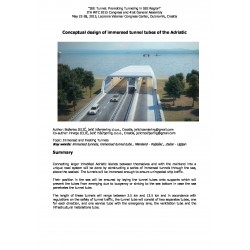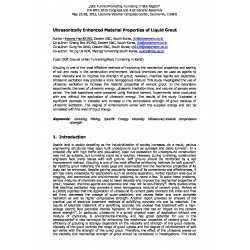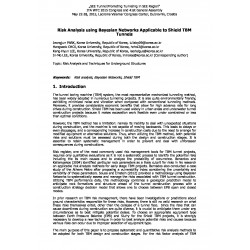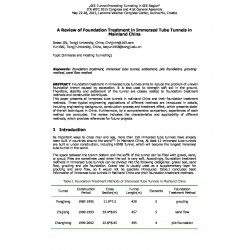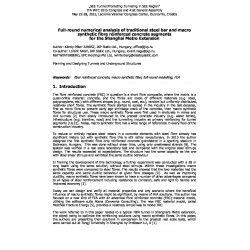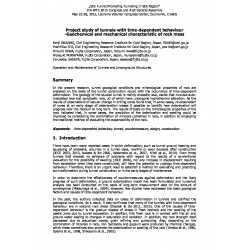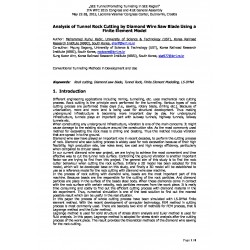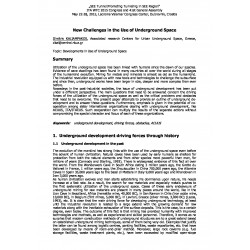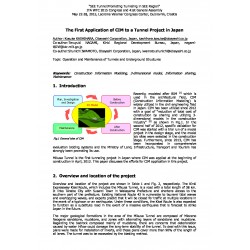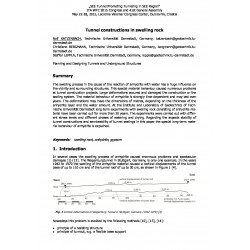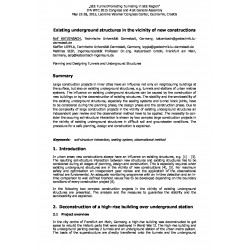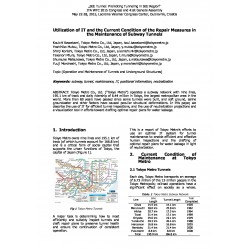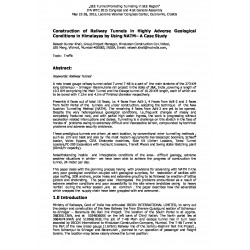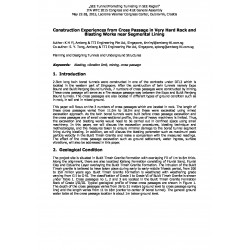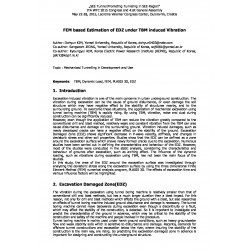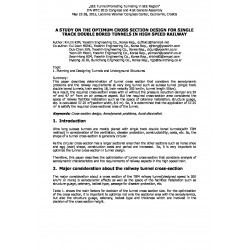No document
Search & filter
Search for a publication
Search & filter
World Tunnelling Congress
WTCThere are 1984 documents.
-
Conceptual design of immersed tunnel tubes of the Adriatic
Abstract: Connecting larger inhabited Adriatic islands between themselves and with the mainland into a unique road system will be done by constructing a series of immersed tunnels through the sea, above the seabed. The tunnels will be immersed enough to ensure unimpeded ship traffic. Their position in the sea will be ensured by laying the tunnel tubes onto supports which will prevent the tubes from...
0,00 € -
Ultrasonically Enhanced Material Properties of Liquid Grout
Abstract: Grouting is one of the most effective methods of improving the mechanical properties and sealing of soil and rocks in the construction environment. Various chemicals can be used as agents to lower viscosity and to improve the strength of grout; however, chemical agents are expensive. Ultrasonic excitation may promote a more homogenous mixture. This study investigated the use of ultrasonic...
0,00 € -
Risk Analysis using Bayesian Networks Applicable to Shield TBM Tunnels
Abstract: The tunnel boring machine (TBM) system, the most representative mechanized tunneling method, has been widely adopted in numerous tunneling projects. It is also quite environmentally friendly, exhibiting minimized noise and vibration when compared with conventional tunneling methods. Moreover, it provides considerable economic benefits that allow for high advance rate for long drives during...
0,00 € -
A Review of Foundation Treatment in Immersed Tube Tunnels in Mainland China
Abstract: Foundation treatment in immersed tube tunnels aims to reduce the problem of uneven foundation trench caused by excavation. It is also used to strength soft soil in the ground. Therefore, stability and settlement of the tunnel are closely related to foundation treatment methods and construction techniques. This paper presents all immersed tube tunnels in mainland China and their foundation...
0,00 € -
Full-round numerical analysis of traditional steel bar and macro synthetic fibre reinforced concrete segments for the...
Abstract: The fibre reinforced concrete (FRC) in question is a short fibre composite, where the matrix is a quasi-brittle material: concrete, and the fibres are made of different materials (e.g. steel, polypropylene, etc.) with different shapes (e.g. round, oval, etc.), random but uniformly distributed, relatively short fibres. The synthetic fibers started to spread in the industry in the last decades,...
0,00 € -
Project study of tunnels with time-dependent behaviour – Geochemical and mechanical characteristic of rock mass
Abstract: In the present research, tunnel geological conditions and mineralogical properties of rock are analysed on the basis of the tunnel construction record with the occurrence of time-dependent deformation. The geology of the studied tunnel is mainly andesitic lava, dacite that includes auto- brecciated lava and pyroclastic rock, all of which have undergone hydrothermal alteration. As the results of...
0,00 € -
Analysis of Tunnel Rock Cutting by Diamond Wire Saw Blade Using a Finite Element Model
Abstract: Different engineering applications including mining, tunnelling, etc. uses mechanical rock cutting process. Rock cutting is the principle work performed for the tunnelling. Various types of rock cutting process are performed these days (i.e., sawing, rotary blade, drilling etc.). Because of urbanization, more and more land is being used for structural development. Thus making underground...
0,00 € -
New Challenges in the Use of Underground Space
Abstract: Utilization of the underground space has been linked with humans since the dawn of our species. Evidence of cave dwellings has been found in many countries all over the world during all stages of the humankind evolution. Mining for metals and minerals is almost as old as the humankind. The industrial revolution equipped us with new tools and technologies to challenge the subsurface and since...
0,00 € -
The First Application of CIM to a Tunnel Project in Japan
Abstract: Recently, modeled after BIM which is used in the architectural field, CIM (Construction Information Modeling) is widely utilized in the civil engineering field in Japan. CIM has been utilized since 2012 with a goal of “reduction of total cost of construction by sharing and utilizing 3-dimensional models in the construction industry” as shown in Fig.1. In the second half of 2012, specific...
0,00 € -
Tunnel constructions in swelling rock
Abstract: The swelling process in the cause of the reaction of anhydrite with water has a huge influence on the vicinity and surrounding structures. This special material behaviour caused numerous problems at tunnel construction projects. Large deformations accured and damaged the construction or the sealing system. The material behaviour of anhydrite is strongly time dependent and may last over years....
0,00 € -
Existing underground structures in the vicinity of new constructions
Abstract: Large construction projects in inner cities have an influence not only on neighbouring buildings at the surface, but also on existing underground structures, e.g. tunnels and stations of urban metros systems. The influence on existing underground structures can be caused by the construction of new buildings or by the deconstruction of existing structures. The stability and the serviceability of...
0,00 € -
Utilization of IT and the Current Condition of the Repair Measures in the Maintenance of Subway Tunnels
Abstract: Tokyo Metro Co., Ltd. (“Tokyo Metro”) operates a subway network with nine lines, 195.1 km of track and daily ridership of 6.44 million in Tokyo, the largest metropolitan area in the world. More than 80 years have passed since some tunnels were built, and soft ground, saline groundwater and other factors have caused peculiar structural deformations. In this paper, we describe the use of IT for...
0,00 € -
Construction of Railway Tunnels in Highly Adverse Geological Conditions in Himalayas by Using NATM – A Case Study
Abstract: A new broad gauge railway tunnel called Tunnel T-48 is a part of the main stretche of the 273 KM long Udhampur – Srinagar- Baramullaha rail project in the state of J&K, India ,covering a length of 10.2 KM comprising the Main Tunnel and the Escape tunnel of 10.20 KM length, each of which are to be bored with 7.12m and 4.5m of finished diameter respectively. Presently 6 faces out of total 10...
0,00 € -
Construction Experiences from Cross Passage in Very Hard Rock and Blasting Works near Segmental Lining
Abstract: 2.3km long twin bored tunnels were constructed in one of the contracts under DTL2 which is located in the western part of Singapore. After the construction of twin tunnels namely Expo Bound and Bukit Panjang Bound tunnels, 7 numbers of cross passages were constructed by mining. These cross passage will serve as a fire escape passage way between the Expo and Bukit Panjang Bound tunnels. The...
0,00 € -
FEM based Estimation of EDZ under TBM induced Vibration
Abstract: Excavation-induced vibration is one of the main concerns in urban underground construction. The vibration during excavation can be the cause of ground disturbance, or even damage the soil structure which may have negative effect to the stability of structures nearby, and to the surrounding ground. To overcome these situations, the application of mechanical excavation using tunnel boring machine...
0,00 € -
A study on the optimum cross section design for single track double bored tunnels in high speed railway
Abstract: This paper describes determination of tunnel cross section that considers the aerodynamic problems and the railway requirements at very long tunnel such as subsea tunnel (single track double bored tunnels, train sealing 18, train velocity 350 km/hr, tunnel length 50km). As a result, the required cross-section areas with or without the pressure reduction damper are 39 m and 47 m from an air...
0,00 €

